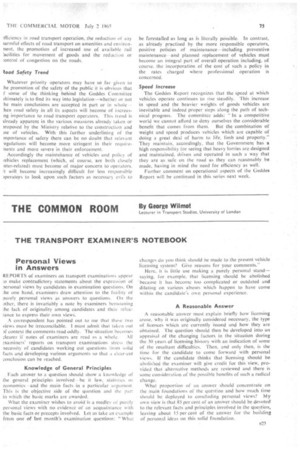THE COMMON ROOM
Page 77

If you've noticed an error in this article please click here to report it so we can fix it.
By George Wilmot
Lecturer in Transport Studies, University of London
THE TRANSPORT EXAMINER'S NOTEBOOK Personal Views in Answers
REPORTS of examiners on. transport examinations appear to make contradictory statements about the expression of personal views by candidates in examination questions. On the one hand, examiners draw attention to the futility of purely personal views as answers to questions. On the other, there is invariably a note by examiners bemoaning. the Jack of originality among candidates and their reluc tance to express their:own views. • A correspondent has pointed out to me that these two views must be irreconcilable. 1 must admit that taken out pf context the comments read oddly. The situation becomes clearer if notes of examiners are read as a whole. All 2xaminers' reports on transport examinations stress the necessity of candidates working out questions from solid Facts and developing various arguments so that a clear-cut conclusion can be reached.
Knowledge of General Principles
Each answer to a question should show .a knowledge of the general principles involved—he it law, statistics Or economics—and the main facts in a particular a rgurnent This is the objective side of the question and the part in which the basic marks are awarded.
What the examiner wishes to avoid is a medley of purely personal views with no evidence of an acquaintance with the basic facts or precepts .involved. Let us take an example fro-in one of last 'month's examination .questions: " What changes do you think should be made to the present •vehicle licensing system? Give -reasons for your comments.
Here, it is little use making a purely personal stand— saying, for example,that licensing should be abolished because it has become too complicated or outdated and dilating on various abuses which happen to have come within the candidate's own personal experience.
A Reasonable Answer
A reasonable answer must explain briefly how licensing arose, why it was originally considered necessary, the type of licences which are currently issued and how they are obtained. The question should then be developed into an appraisal of the changing factors in the situation during the 30 years of licensing history with an indication of some of the resultant difficulties. Then, and only then, is the time for the candidate to come forward with personal views. If the candidate thinks that licensing should be abolished the examiner will give credit for this view, provided that alternative methods are reviewed and there is some consideration of the possible benefits of such a radical change.
What prOportion of an answer should concentrate on the main foundations of the question and how much time should be deployed to concluding personal views? my own view is that 85 per cent of an answer should be devoted to the relevant facts and principles involved in the quetiOn, leaving about 15 per cent of the answer for the building of personal. ideas on this solid foundation.
























































































































